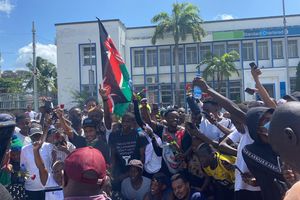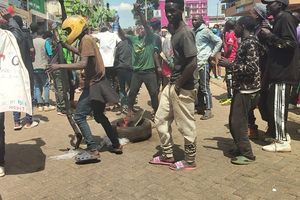
Tanzanian Bongo musician, Marima Lawrenceis alias Marlaw.
We are at the point of in our annual national calendar where insoluble gridlocks, interminable tailbacks, intractable mayhem and incorrigible congestion become a normal feature of our travel and commuting culture.
Great thoroughfares which ordinarily funnel hundreds of thousands to and from their far-flung destinations with effortless efficiency, are now heavily constipated, the fluid transit of one motor vehicle after another having turned into a horrifying coagulation of intemperate, impatient, volatile and highly combustible stranded citizens weathering the inclement elements of this capricious season, and celebrating its festivities with tears of frustration and groans of unbearable distress.
Many of us, who find ourselves from time to time having to traverse the country at the height of the feverish madness of peak holiday helter-skelter, will have had at least a taste of the trials and tribulations to be endured in those truly unbearable hours or entire days and nights incarcerated in a traffic standstill with no relief in sight. The sense of condign punishment through excruciating ordeal, garnished with desperate suspense, is biblical in scale and intensity. The experience is unforgettable, and can alter personal routines and commuting habits for a lifetime.
Playful pathos
A Tanzanian artiste who went, or goes by Marlaw wonderfully depicted this experience with supreme artistry and a paradoxically evocative sense of playful pathos in one of East Africa's early millennium musical sensations. His persona narrates his misery in languid Kiswahili rhyme set in a rollicking percussive tempo, and a wonderfully upbeat syncopated bass line, which intensify the sense of urgency and pressure while also insinuating cheerful but devastating satire at the affectations of the aspirational motoring classes.
The wordplay rendered in such fluid cadence takes one through the various declensions of the most unremarkable word, (ku)onea, in the stanza after ominously exclaiming unrequited “Hallo!” thrice: Unanikatia simu unanionea, we' ungekuwepo ungejionea, unafanya hivo unakosea mama.... This sequence proceeds to a heartrending plea in the last stanza: “huruma nionee”.
Pathetic plight
Why is the persona in such a pathetic plight? It turns out that he is a citizen working in the diaspora, who arrived on the previous day and promptly alerted his people. Whilst preparations to accord him a sumptuous reception commensurate with his remittance profile proceed at home, he has run into the city's notorious jam, where he has been detained for over six hours, and now finds himself at his wits' end, having run out of patience. The telephone calls have escalated from patient reassurance and anticipation to suspicion and frustration and, as poignantly narrated: “Nimeshamwambia mama nimefika tangu jana, anajua nimeshafika, ameshapika, amekasirika, alipika tangu mchana, ila sasa lunch imegeuka dinner...”
This is the premise for his opening stanza: Ninataka niwahi kufika, njia ina jam sasa wapi nitapita, nimekaa karibia saa sita, sasa kukaa nimechoka .....” The intolerable threat of total domestic breakdown impels the beleaguered narrator to declare a hell-bent-for-leather, zero-sum answer to the question, “sasa wapi nitapita?”, which is, “Nimechoka kuketi highway! nitapita kokote mradi we! ili kama ni kesi na iwe! He is not just exasperated by inordinate detention on the stifling highway, he has utterly despaired of the utility of complying with the Highway Code under these conditions, and has resolved to go rogue, whatever the consequences.
Just like that, highway sociopath emerges. Anyone can visualise the ensuing desperation, hare-brained illicit manoeuvrings, dangerous short-cuts, wildly reckless overtaking and astonishing eruption of antisocial conduct. As a response to the gridlock, this cavalier strategy will not solve his problems, and will only compound an already intractable aggregation of similarly misdirected motoring policies.
Hot-headed motorists
All the delinquency that is responsible for the bedlam on our roads at this moment, are nothing but the failed strategies of hot-headed motorists convinced that the urgency of their private interests can legitimately override the collective good, forgetting that everyone on that road is headed to a personally critical place or event.
The free-rider who defines a specific public goods problem is obviously a delinquent. The motorists who subverts traffic order and safety to have their at everyone else's expense is a particularly myopic yet vicious species of free-rider. A solipsistic preoccupation with illusory short-term advantage, without a care for the interests of others lies at the heart of all antisocial behaviour, ranging from corruption to felonies as well as petty crime. Arguably, therefore, all the jam does is expose the ease with which ostensibly upstanding people lapse into harmful misconduct: all that is required, apparently, is a sufficiently urgent and personal excuse.
Marlaw's persona claimed that he was tired of honking. No one forced him. He also claimed that he was fed up with “kuketi highway”; he might have stood or walked. The best way to enjoy public goods, always, is to contribute to everyone else's enjoyment, just as the easiest way to deny oneself the benefits of public goods is to impair others' enjoyment. Everyone is in a hurry to get home for holidays; it is absurd to assume that anyone came to languish on the highway.
Mr Ngéno is an Advocate of the High Court










